Musings

This time of the year, I always stop and admire the jasmine vines covering the fence in front of a neighbors’ house. The blooms are so glorious in the sun (yesterday, not today, I admit).
Most people from around here call this yellow or Carolina jasmine, and sometimes pronounce the latter jess-ah-min, so it has the alternate spelling jessamine. I did not know how toxic the plant is until I read that Wikipedia entry….
* Pitiful reference to the line: Why is the sky Carolina blue?
Posted at 10:22 PM |
1 Comment »

I can’t even guess what kind of phlox this is. BTW, phlox is a funny word, with its roots in the Greek word for flame. Appropriate, no? Yet, phlox varieties are native to North America and northeast Asia!
Today I heard lawn mowers for the first time, both to the south and to the east. Believe it or not!
Of course, the operators could have been conducting last-minute leaf-herding, instead of trimming spring-fresh grass….
In neighborhood news, Dish, once a favorite upscale restaurant of ours, is gone and defunct. A carpenter working on the redesign says the new restaurant going into the former gas-station location will be called Diesel. Still, I’m not warming to the idea of a restaurant named after a poison.
I’m not sure I’d feel that much better if it were named Biodiesel….
Posted at 5:18 PM |
1 Comment »
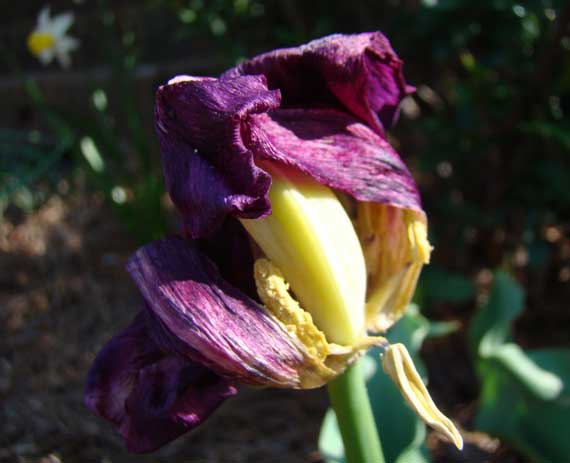
Our tulips are fading, but some of the neighbors’ still look tip-top. I saw the first drifts of yellow pollen yesterday (sneeze).
Today’s vocabulary: aliquot (‘alikwət)
(noun) a portion of the larger whole, especially a chemical sample
(verb) to divide a whole into parts, or to take parts from a whole
Posted at 4:03 PM |
3 Comments »
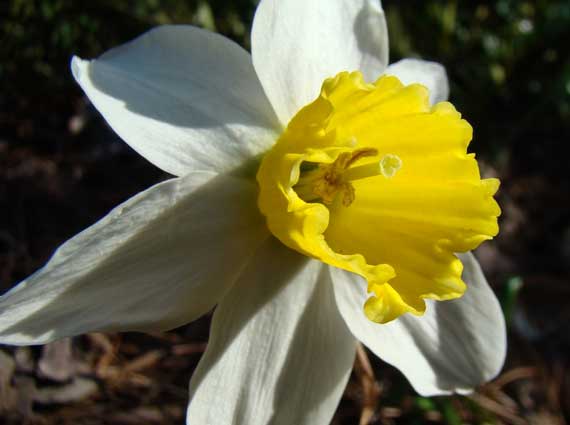
…is that They* are predicting temps below freezing overnight….
* They in this case are meteorologists…which sounds like a term that should refer to scientists who study meteors, but instead refers to science-types who focus on “the processes and phenomena of the atmosphere,” and, therefore, actually means more than just weather stuff. But (third but of this entry), meteorologist does sound a bit tidier and more, well, serious and empirical, than “weather forecaster” or even the more colloquial weather-dude or weather-babe.
Posted at 10:19 PM |
1 Comment »
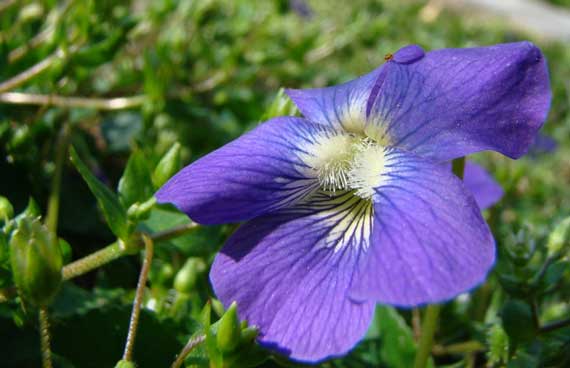
I suspect this is a dog violet; this type takes over our yard this time of the year (since we don’t do heavy chemical treatments, and, geeze, yeah, who manages to make time to do much weeding!).
I know some people are obsessed and/or fascinated by violets, but I only look at them once or twice a year, then move on.
So, I check my ol’ buddy Wikipedia for general reference info on violets, and find out they are more properly referred to as a group as violas (which I thought a musical instrument), and that pansies are a kind of viola-flower. Well, duh, they look like big violets, so I guess that makes a bit of sense, but I’ve also learned that simple large-scale morphological similarities aren’t always enough to indicate close relationships in modern taxonomics….
Posted at 4:49 PM |
2 Comments »
Recently I encountered this article abstract, Virtual water: Virtuous impact? The unsteady state of virtual water (2007), by Dik Roth and Jeroen Warner, and the phrase “virtual water” sure caught my eye. What they mean is water needed for crop production, with the implication that if you get your food from elsewhere, the water needed to grow (and ship) that food comes from that environment, not locally to you. I first encountered this concept, absent the catchy name, when a guide we had in Tanzania observed that flowers grown in Africa and shipped to the voracious flower markets in Europe meant Africa was effectively exporting water since flowers take so much to grow to the blooming stage. Anyway, having yesterday driven through flooding in Ohio and water sluicing in ditches in Kentucky, while thinking about the drought here in Georgia, water’s been on my mind.
To reduce the amount of virtual water you consume (or cause to be used), consider following Michael Pollan’s prescription: Eat food. Not too much. Mostly plants. (Pollan’s link, and a NYTimes article….)
Today’s vocabulary: iteroparous
Applies to organisms that reproduce more than once during their lifetimes. Examples include mammals, perennial plants. Iteroparous plants are more common in the tropics. In contrast, semelparous organisms reproduce only once in a lifetime. In general, semelparous species will produce more offspring from their single breeding event than iteroparous species. Iteroparity appears to be an adaptation to environmental (and thus reproductive) uncertainty.
I thought this a fine word (well, pair of words) for springtime….
Posted at 6:14 PM |
1 Comment »
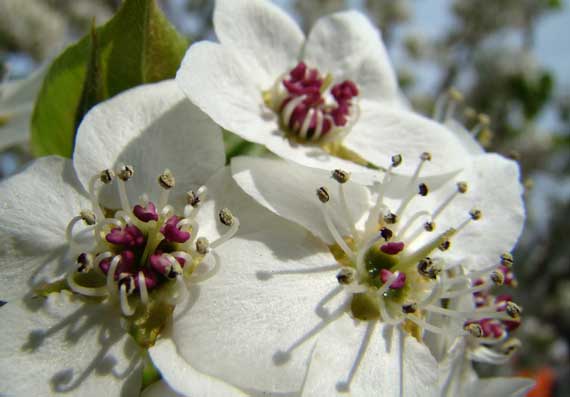
…the bees didn’t stay in one place long enough to have their picture taken….
Actually, this may be a pear and not an apple; still both are within Rosaceae…so, I guess I shoulda thought more ’afore I labeled this Malus….
Today’s vocabulary: bloom
Among its meanings, bloom as a noun has somewhat contradictory references both 1) to being in the state of flowering, and 2), to the light, powdery (natural) surface deposit on leaves or the skin of fruit, e.g., apples, plums, grapes. So, in the growth sequence of Malus (and other species), bloom can be used twice—at least.
Posted at 4:18 PM |
1 Comment »
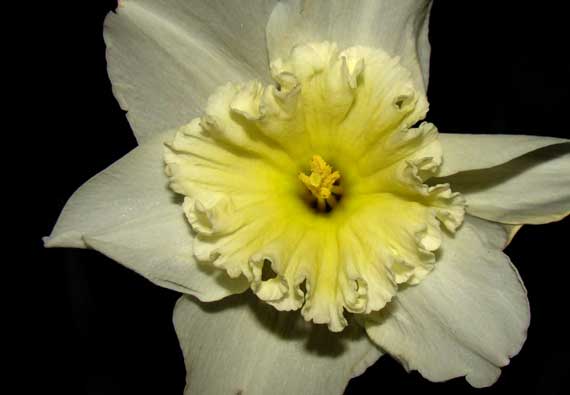
To a great degree, our vocabularies reflect the kinds of things we feel a need to express. In other words (haha), the words we originate, use and keep current in our languages reflect the things we feel a need to say. Thus, unfamiliar words judged archaic by our dictionaries are words for things we no longer talk about—or for things for which we have other or newer terminology.
One category of words that are now uncommon in American English refer to landscape features. A quick glance at place names across the British Isles reveals myriad examples, which include holm, -stead, and heath. Suffixes -bridge and -ford remain current in our vocabularies and thus are self-explanatory.
Today’s vocabulary*: holm
a flat piece of ground adjacent to a river that floods when the water level is high
Today’s vocabulary: -stead
suffix referring to place or town, of Germanic origin and related to the Dutch stad
Today’s vocabulary: heath
an area of open, uncultivated land vegetated with low vegetation like gorse, heather, and grasses [differs from forests or cultivated lands, for example]
* Definitions adapted from Apple dictionary.
Posted at 6:40 PM |
Comments Off on ≠Back talk

Ok. Here’s another popular culture version of prehistory, this one the movie 10K BC. With trepedation, I checked out the NYTimes review and immediately a word I’d never seen before jumped out at me. Was this an archaeology term I’d missed (and how?)? Or popular culture I’d missed—maybe a insurance commercial or two?
Ah, Google informed me—the latter. A.O. Scott’s word snuffleupagus is a lower-case corruption of the name of a character on Sesame Street, Aloysius Snuffleupagus—a superhuman sized puppet that looks something like a tuskless mammoth/mastodon.
And, yet, Scott uses the word as if it is a synonym for mammoth/mastodon, or as if it is a real species term:
…the Yagahl, a tribe of snuffleupagus hunters…
and:
…the big, climactic fight, complete with an epic snuffleupagus rampage…
FYI NYT and A.O. Scott: mammoth≠mastodon≠ snuffleupagus (or even Snuffleupagus).
Note: this etymological snafu bothered me so much I was distracted from the other prehistoric misinformation I’m sure the movie dispenses….
Posted at 11:39 AM |
4 Comments »

Hey, this was the closest I could come to the “name in lights” theme from our archive of personal photos….
Today’s theme: friends making splashes (aka excellent adventures!)….
First, last night. Rey was on Jeopardy. Came in second! From all I hear, when you’re up, the key wrinkle is more the button to ring in than anything else—the limiting factor certainly is not what you know.
And this morning: Nancy figured out that a White House PR person (“senior White House aide”) had plagiarized, and not at all subtly, and broke the story on her blog. 235 comments as of this post. And more plagiarism uncovered. So far, the White House response is disappointment. Elsewhere, comments are already up on the Washington Post page and I understand the issue has been mentioned in the Situation Room. And, of course, JCB has commented extensively, wisely, and with erudition….
KUDOS to Rey and Nancy!
Posted at 6:27 PM |
1 Comment »









